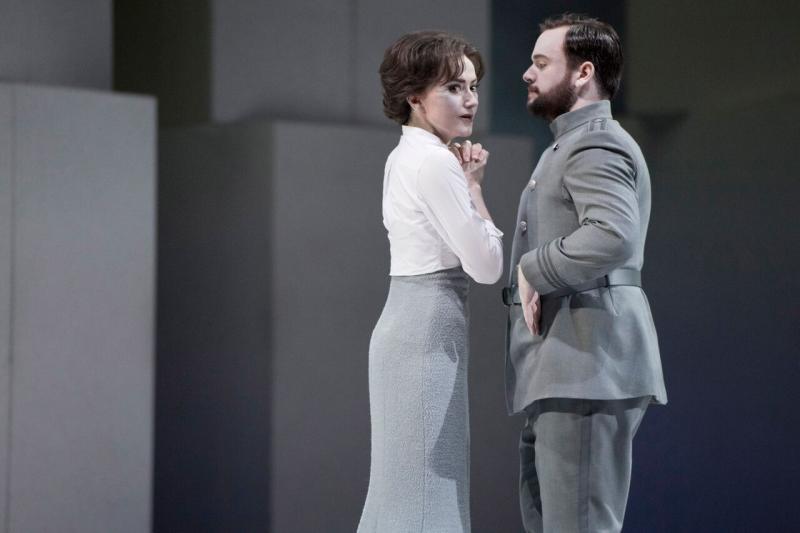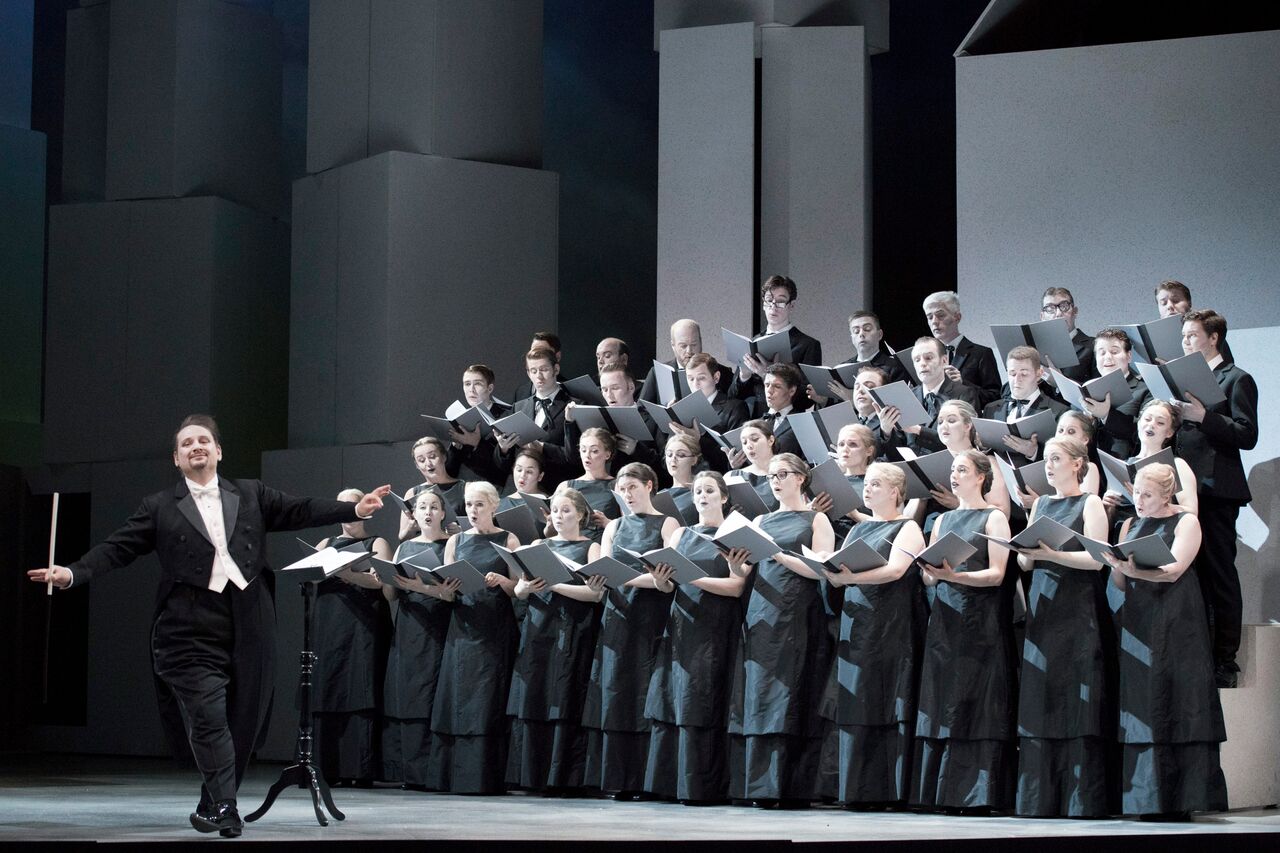Béatrice et Bénédict, Glyndebourne | reviews, news & interviews
Béatrice et Bénédict, Glyndebourne
Béatrice et Bénédict, Glyndebourne
Vin ordinaire all round in what should be a sparkling caprice

Locations count for little in most of Shakespeare's comedies. Only a literal-minded director would, for instance, insist on Messina, Sicily as the setting for Much Ado About Nothing. In Béatrice et Bénédict, on the other hand, Berlioz injects his very odd Bardolatry with lashings of the southern Italian light and atmosphere he loved so much.
Berlioz doesn't make it easy to animate his oblique take on the much more nuanced original. None of the crucial situations in Shakespeare - the gulling of Beatrice and Benedict into believing that each is loved by the other, the crucial scene where they admit what they've been hiding beneath their barbs - gets set to music. The whole plot whereby an initially anaemic - and, in the right hands, not so secondary - pair of lovers find themselves emotionally challenged by the machinations of a villain who doesn't feature in the opera goes out the window. That makes soprano Héro a cipher with lovely music, her fiancé Claudio a non-part and the verbal fencers defenceless without something to react against (who can forget Beatrice's "Kill Claudio" in a good production of the play?) To be fair, Pelly does encourage Agathe Mélinand to restore more Shakespearean lines to the dialogue, but it's not enough.

The plus ought to be the unexpected intermezzi which are the highlights of the score - the duet for Héro and Ursule, the trio in which similar music finds them joined by Béatrice (pictured above), the poetry of the ensuing chorus. But all Pelly can find for the usually ravishing nocturne is a box with a wedding dress inside while grey skies persist behind (it was some compensation that the real grey skies had given way to sunshine as we emerged at the interval from this disappointment). It's the worst kind of production in which an idea is allowed to run riot and dominate an entire show - though Pelly's regular set designer Barbara de Limburg, trademark creator of the supermarket witch's house in his superb Glyndebourne Hänsel und Gretel, works wonders within the narrow stylistic exercise.
The voices don't help. Sophie Karthäuser, Héro in a terrible blonde wig for the first half of the run - pray that Anne-Catherine Gillet is better if you have tickets for the second - lacks the lyric-soprano warmth just as Stéphanie d'Oustrac has no sensuality in her distinctive mezzo (though she's a vivid stage presence and can at least sing pianissimo in her aria, the less disappointing of the two big solo numbers for the ladies). At least Karthäuser blends well with the Ursule of Katarina Bradié - not the case with the two singers at the awful RSC Shakespeare gala earlier this year.
It's true that Glyndebourne lost its intended Héro, Hélène Guilmette, and, for the whole of this season, its brilliant chief conductor Robin Ticciati, well on the way to recovery after an operation for a herniated disc. His replacement, Antonello Manacorda, is competent and precise but lacks élan, though the London Philharmonic Orchestra plays well throughout; I was saddened but not surprised when a newcomer told me she found the overture a bore, because in the right hands it's a cut-and-thrust gem.The much-touted Bénédict, Paul Appleby, starts brightly but sounds rough in the upper register when he should ping out his seeming insouciance.

The only other role of any significance is crass music-master Somarone, in the divertissement Berlioz provided to substitute for the knockabout of Dogberry and Verges. Let's face it, he's not funny, though Pelly and the admirable Lionel Lhote do their best. The Glyndebourne Chorus (pictured above with Lhote) are the real stars. They get some lovely music as well as Pelly's trademark crispness of mass semaphoring, but they can't claim to stand alongside ace soloists, as their 1992 counterparts did when Glyndebourne took over the Royal Festival Hall during the construction of the new house was taking shape (such memories of Anne-Sofie von Otter, Dawn Upshaw, Jerry Hadley, Jean Rigby).
The best solo voices are the flutes which punctuate the Nocturne. That would suggest that there's not enough to praise; sorry, you're in for a mostly dreary evening if you have yet to see it. With the new Barber of Seville also not as funny as it should be, that makes two misfires for Glyndebourne on the new productions front; by all accounts the failsafe Grandage Figaro shines brighter than ever this year with a superb cast, and the vintage Peter Hall production of A Midsummer Night's Dream coming soon shouldn't disappoint. A greater Berlioz homage to Shakespeare, Roméo et Juliette, should make amends at the Proms on Saturday.
rating
Explore topics
Share this article
The future of Arts Journalism
You can stop theartsdesk.com closing!
We urgently need financing to survive. Our fundraising drive has thus far raised £49,000 but we need to reach £100,000 or we will be forced to close. Please contribute here: https://gofund.me/c3f6033d
And if you can forward this information to anyone who might assist, we’d be grateful.

Subscribe to theartsdesk.com
Thank you for continuing to read our work on theartsdesk.com. For unlimited access to every article in its entirety, including our archive of more than 15,000 pieces, we're asking for £5 per month or £40 per year. We feel it's a very good deal, and hope you do too.
To take a subscription now simply click here.
And if you're looking for that extra gift for a friend or family member, why not treat them to a theartsdesk.com gift subscription?
more Opera
 La bohème, Opera North review - still young at 32
Love and separation, ecstasy and heartbreak, in masterfully updated Puccini
La bohème, Opera North review - still young at 32
Love and separation, ecstasy and heartbreak, in masterfully updated Puccini
 Albert Herring, English National Opera review - a great comedy with depths fully realised
Britten’s delight was never made for the Coliseum, but it works on its first outing there
Albert Herring, English National Opera review - a great comedy with depths fully realised
Britten’s delight was never made for the Coliseum, but it works on its first outing there
 Carmen, English National Opera review - not quite dangerous
Hopes for Niamh O’Sullivan only partly fulfilled, though much good singing throughout
Carmen, English National Opera review - not quite dangerous
Hopes for Niamh O’Sullivan only partly fulfilled, though much good singing throughout
 Giustino, Linbury Theatre review - a stylish account of a slight opera
Gods, mortals and monsters do battle in Handel's charming drama
Giustino, Linbury Theatre review - a stylish account of a slight opera
Gods, mortals and monsters do battle in Handel's charming drama
 Susanna, Opera North review - hybrid staging of a Handel oratorio
Dance and signing complement outstanding singing in a story of virtue rewarded
Susanna, Opera North review - hybrid staging of a Handel oratorio
Dance and signing complement outstanding singing in a story of virtue rewarded
 Ariodante, Opéra Garnier, Paris review - a blast of Baroque beauty
A near-perfect night at the opera
Ariodante, Opéra Garnier, Paris review - a blast of Baroque beauty
A near-perfect night at the opera
 Cinderella/La Cenerentola, English National Opera review - the truth behind the tinsel
Appealing performances cut through hyperactive stagecraft
Cinderella/La Cenerentola, English National Opera review - the truth behind the tinsel
Appealing performances cut through hyperactive stagecraft
 Tosca, Royal Opera review - Ailyn Pérez steps in as the most vivid of divas
Jakub Hrůša’s multicoloured Puccini last night found a soprano to match
Tosca, Royal Opera review - Ailyn Pérez steps in as the most vivid of divas
Jakub Hrůša’s multicoloured Puccini last night found a soprano to match
 Tosca, Welsh National Opera review - a great company reduced to brilliance
The old warhorse made special by the basics
Tosca, Welsh National Opera review - a great company reduced to brilliance
The old warhorse made special by the basics
 BBC Proms: The Marriage of Figaro, Glyndebourne Festival review - merriment and menace
Strong Proms transfer for a robust and affecting show
BBC Proms: The Marriage of Figaro, Glyndebourne Festival review - merriment and menace
Strong Proms transfer for a robust and affecting show
 BBC Proms: Suor Angelica, LSO, Pappano review - earthly passion, heavenly grief
A Sister to remember blesses Puccini's convent tragedy
BBC Proms: Suor Angelica, LSO, Pappano review - earthly passion, heavenly grief
A Sister to remember blesses Puccini's convent tragedy
 Orpheus and Eurydice, Opera Queensland/SCO, Edinburgh International Festival 2025 review - dazzling, but distracting
Eye-popping acrobatics don’t always assist in Gluck’s quest for operatic truth
Orpheus and Eurydice, Opera Queensland/SCO, Edinburgh International Festival 2025 review - dazzling, but distracting
Eye-popping acrobatics don’t always assist in Gluck’s quest for operatic truth

Add comment